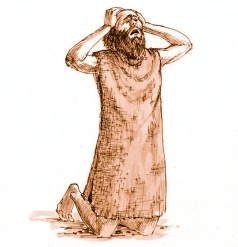 Webster’s Dictionary defines lament is “to express sorrow, regret, grief over something; to mourn aloud”, and that is precisely what we find in this short book. Written by Jeremiah, it is best to view it as a continuation of the book by his name – reading it at the conclusion of the former. As we have read through Jeremiah’s prophecies, we have seen his pleas and words of warning go unheeded as Jerusalem speeds towards destruction due to her disobedience. They mocked him, put him in public stocks, and even threw him in prison as he cried out his message of impending doom to the people of Judah. Instead of listening to his words, believing his message, and repenting of their sin – the rulers/citizens of Jerusalem simply dismissed him as irrelevant and an enemy of the state.
Webster’s Dictionary defines lament is “to express sorrow, regret, grief over something; to mourn aloud”, and that is precisely what we find in this short book. Written by Jeremiah, it is best to view it as a continuation of the book by his name – reading it at the conclusion of the former. As we have read through Jeremiah’s prophecies, we have seen his pleas and words of warning go unheeded as Jerusalem speeds towards destruction due to her disobedience. They mocked him, put him in public stocks, and even threw him in prison as he cried out his message of impending doom to the people of Judah. Instead of listening to his words, believing his message, and repenting of their sin – the rulers/citizens of Jerusalem simply dismissed him as irrelevant and an enemy of the state.
The end result was Nebuchadnezzar came and destroyed Jerusalem – just as Jeremiah foresaw.
Now – the book of Lament opens amid the smoldering ruins of the city. The Chaldeans have completed the destruction of Jerusalem around 616 B.C. and Jeremiah records great feelings of grief and sorrow at what has happened. Many of the citizens had been carted off to Babylon as POW’s – and Jeremiah is allowed to return to ground zero. The Septuagint reads “And it came to pass after Israel had been taken captive and Jerusalem had been laid waste, that Jeremiah sat weeping, and uttered his lamentation over Jerusalem…”
The Book of Lamentations is a collection of 5 poems – each more heart wrenching then the others. In fact – the very first word of the book sets the tone for what will be said over the next 5 chapters:
“How solitary and lonely sits the city [Jerusalem] that was [once] full of people! How like a widow has she become! She who was great among the nations and princess among the provinces has become a tributary [in servitude]!” – Lam 1:1 AMP
How (or Alas) is an exclamation of pain and grief; a wailing cry like the howl of a jackal or a wolf. It clearly sets a tone of unimaginable pain and mourning over a city that has been needlessly lost and a people who will now suffer due to their own ignorance. Ironically, it is Jeremiah who feels the most heartache over what has happened (despite the fact that he had been warning them for the past 30 years).
Can you imagine how Jeremiah was feeling?
This was the city he loved. These were his people, his kinsmen. He had seen it all coming for years, warning, pleading, begging his people to turn back to the Lord. He had met with kings, shouted in the courts, cried out in the marketplace – all to no avail.
As you read through this short book, remember what has preceded it. While the language speaks of the Lord doing the destroying (1:5, 15, 21), we know that it is actually the Babylonians/Chaldeans who did it. The poetic language places the fault at the feet of Jerusalem herself (1:3) due to her sin, and the Lord has allowed it. Her repeated sinful choices have caused the Lord to withdraw His hand of protection and blessing from over the city, resulting in the Babylonian victory.
Also, notice the change of heart in Jerusalem after the fact. Lam 1:11 contains a short prayer, “See, O Lord, and consider how wretched and lightly esteemed, how vile and abominable, I have become!” This is the kind of prayer Judah and Jerusalem would never have prayed before their pride was crushed and trampled in the dirt. Now they could say the humble prayer of a sinner – short and simple like that of the publican in Luke 18:13.
If only they had found that humble voice when Jeremiah had warned them.
Be fruitful & multiply,
PK
